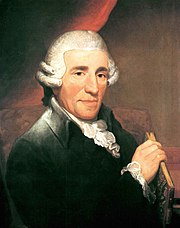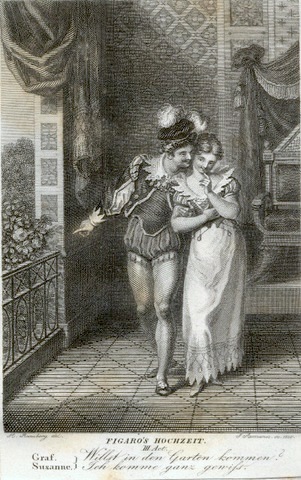
The Marriage of Figaro, K. 492, is a commedia per musica in four acts composed in 1786 by Wolfgang Amadeus Mozart, with an Italian libretto written by Lorenzo Da Ponte. It premiered at the Burgtheater in Vienna on 1 May 1786. The opera's libretto is based on the 1784 stage comedy by Pierre Beaumarchais, La folle journée, ou le Mariage de Figaro. It tells how the servants Figaro and Susanna succeed in getting married, foiling the efforts of their philandering employer Count Almaviva to seduce Susanna and teaching him a lesson in fidelity.

The Barber of Seville, or The Useless Precaution is an opera buffa in two acts composed by Gioachino Rossini with an Italian libretto by Cesare Sterbini. The libretto was based on Pierre Beaumarchais's French comedy The Barber of Seville (1775). The première of Rossini's opera took place on 20 February 1816 at the Teatro Argentina, Rome, with designs by Angelo Toselli.

Helen Jeanette Donath is an American soprano with a career spanning fifty years.

Arabella, Op. 79, is a lyric comedy, or opera, in three acts by Richard Strauss to a German libretto by Hugo von Hofmannsthal, their sixth and last operatic collaboration.
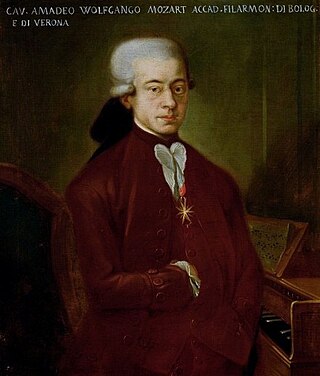
La finta semplice, K. 51 (46a) is an opera buffa in three acts for seven voices and orchestra, composed in 1768 by then 12-year-old Wolfgang Amadeus Mozart. Young Mozart and his father Leopold were spending the year in Vienna, where Leopold was trying to establish his son as an opera composer. He was acting on a suggested request from the Emperor Joseph II that the young boy should write an opera.
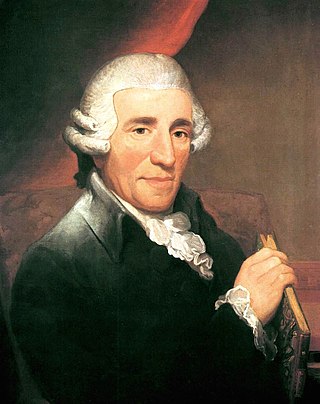
Il mondo della luna, Hob. XXVIII:7, is an opera buffa by Joseph Haydn with a libretto written by Carlo Goldoni in 1750, first performed at Eszterháza, Hungary, on 3 August 1777. Goldoni's libretto had previously been set by six other composers, first by the composer Baldassare Galuppi and performed in Venice in the carnival of 1750. It was then adapted for Haydn's version of the opera, which would be performed during the wedding celebrations of Count Nikolaus Esterházy, the younger son of Haydn's patron, Prince Nikolaus Esterházy, and the Countess Maria Anna Wissenwolf. It is sometimes performed as a singspiel under its German title Die Welt auf dem Monde.
Luigia Polzelli was an Italian mezzo-soprano, who sang at the Esterházy court in Hungary during the late 18th century. She was for a number of years the lover of the composer Joseph Haydn.

L'isola disabitata, Hob. 28/9, is an opera by Joseph Haydn, his tenth opera, written for the Eszterházy court and premiered on 6 December 1779. The libretto by Metastasio, the only one by that author Haydn set, was previously set by Giuseppe Bonno and subsequently used by Manuel García. Nino Rota has set excerpts to music as well.

Orlando paladino, Hob. 28/11, is an opera in three acts by Joseph Haydn which was first performed at Eszterháza on 6 December 1782. The libretto by Nunziato Porta is based on another libretto, Le pazzie d'Orlando, by Carlo Francesco Badini, itself inspired by Ariosto's epic poem Orlando furioso. The opera was described as a dramma eroicomico and the plot mixes heroic and comic elements. It was Haydn's most popular opera during his lifetime. While in Prague, Mozart conducted a few performances of the opera. The Pennsylvania Opera Theater presented the United States premiere of the work at the Trocadero Theatre, Philadelphia, in March 1982 with John Gilmore in the title role.

L'infedeltà delusa, Hob. 28/5, is an operatic burletta per musica in two acts by Joseph Haydn. The Italian libretto was by Marco Coltellini.

La fedeltà premiata, Hob. XXVIII/10, is an opera in three acts by Joseph Haydn first performed at the Eszterháza palace in Fertőd, Hungary, on 25 February 1781 to celebrate the reopening of the court theatre after a fire. The opera was revised for a new version first performed in 1782.
Wladimiro Ganzarolli was an Italian operatic bass-baritone, particularly associated with Mozart and Rossini roles.

L’incontro improvviso is an opera in three acts by Joseph Haydn first performed at Eszterháza on 29 August 1775 to mark the four-day visit of Archduke Ferdinand, Habsburg governor of Milan and his consort Maria Beatrice d'Este. The opera is designated a dramma giocoso and is an example of the then Austrian fascination with Turkish subjects.
La vera costanza, is an operatic dramma giocoso in three acts by Pasquale Anfossi. The comédie larmoyante-influenced Italian libretto was by Francesco Puttini. The opera preceded Joseph Haydn's better known setting of the same libretto by three years.
Claes-Håkan Ahnsjö is a Swedish operatic tenor particularly associated with the baroque repertoire and Mozart works.
Kathryn Day is an American opera singer who has had an active international career spanning five decades. She began her career as a leading soprano under the name Kathryn Bouleyn in the 1970s and 1980s with companies like the New York City Opera, the San Francisco Opera, and the Opera Theater of Saint Louis. With the latter institution she created the role of Cora in the world premiere of Stephen Paulus' The Postman Always Rings Twice (1982).
Kari Løvaas is a Norwegian operatic soprano who made an international career outside Scandinavia, mostly using the German spelling of her name, Kari Lövaas. She has performed at international festivals such as the Salzburg Festival and the Lucerne Festival in both opera and concert. She participated in complete recordings of rarely performed operas, including works by Haydn and composers of the 20th century, has recorded Lieder and has regularly appeared in choral concerts.
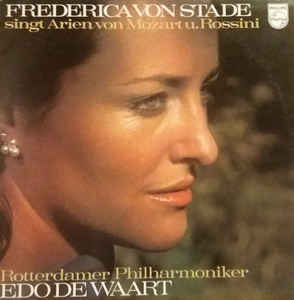
Frederica von Stade sings Mozart & Rossini Arias is a 52-minute studio album of operatic arias performed by von Stade and the Rotterdam Philharmonic Orchestra under the direction of Edo de Waart. It was released in 1976. A second, 69-minute version of the album, Frederica von Stade: Haydn, Mozart & Rossini Arias, released by Philips on CD, adds bonus tracks derived from von Stade's contributions to Antal Doráti's recordings of Joseph Haydn's operas La fedeltà premiata and Il mondo della luna. A third, 52-minute version released on SACD by PentaTone in 2005 reverts to the contents of the first version, but presents the music in quadraphonic surround sound.

Il mondo della luna is a 211-minute studio album of Joseph Haydn's opera, performed by Luigi Alva, Arleen Augér, Anthony Rolfe Johnson, Edith Mathis, Frederica von Stade, Lucia Valentini Terrani and Domenico Trimarchi with the Chœurs de la Radio Suisse Romande and the Orchestre de Chambre de Lausanne under the direction of Antal Doráti. It was released on LP in 1978 and on CD in 1992. Its CD version included nine bonus arias of Haydn's, mostly written to be inserted into other composers' works, performed by Mathis and the Orchestre de Chambre de Lausanne under the direction of Armin Jordan.
